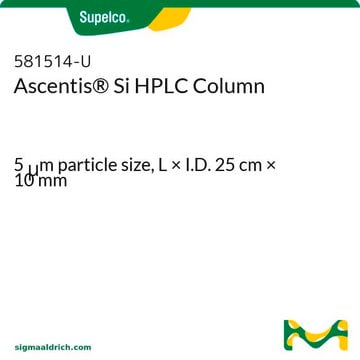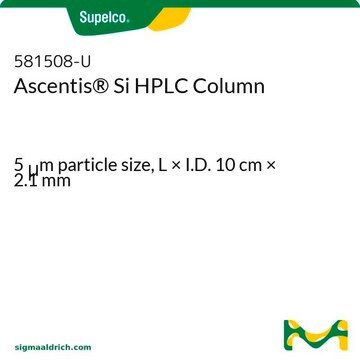581509-U
Ascentis® Si (5 µm) HPLC Columns
L × I.D. 15 cm × 2.1 mm, HPLC Column
About This Item
Recommended Products
product name
Ascentis® Si HPLC Column, 5 μm particle size, L × I.D. 15 cm × 2.1 mm
material
stainless steel column
Agency
suitable for USP L3
product line
Ascentis®
feature
endcapped: no
manufacturer/tradename
Ascentis®
packaging
1 ea of
parameter
≤70 °C temp. range
400 bar pressure (5801 psi)
technique(s)
HPLC: suitable
LC/MS: suitable
L × I.D.
15 cm × 2.1 mm
surface area
450 m2/g
impurities
<5 ppm metals
matrix
fully porous particle
silica gel high purity, spherical
matrix active group
silica phase
particle size
5 μm
pore size
100 Å
operating pH range
2-6
application(s)
food and beverages
separation technique
hydrophilic interaction (HILIC)
normal phase
Looking for similar products? Visit Product Comparison Guide
General description
The Ascentis Si is a high loading capacity silica with excellent peak shape. The Ascentis Si performs in both normal-phase and HILIC/ANP (aqueous normal phase) mode.
Legal Information
Choose from one of the most recent versions:
Already Own This Product?
Find documentation for the products that you have recently purchased in the Document Library.
Protocols
Amino Acid Analysis is the suitable tool for precise determination of protein quantities but also provides detailed information regarding the relative amino.
Our team of scientists has experience in all areas of research including Life Science, Material Science, Chemical Synthesis, Chromatography, Analytical and many others.
Contact Technical Service






